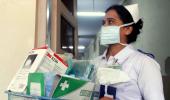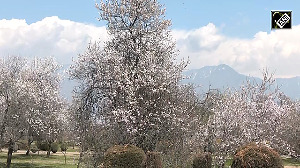Doughty frontline workers say this is what they signed up for and that is what they do.

Being trapped inside Personal protective equipment suits for six hours is tough, battling the fear of contracting COVID-19 tougher and not meeting children, spouses or parents for weeks the toughest. But that is what they signed up for and that is what they do, say the doughty doctors and nurses at the AIIMS Trauma Centre.
Their days revolve around their COVID-19 patients and their lives around their families and the twain can never meet. That is the maxim for the band of frontline warriors in the battle against the pandemic who go to extraordinary lengths to isolate themselves from their loved ones and ensure the two halves that make up their world stay completely separate.
Like Vikas and Jyoti Yadav, both nursing officers, who live with their children, an 11-year-old daughter and a nine-year-old son, in suburban Gurgaon but haven't met them for days.
The couple, both posted in the COVID-19 ward of the Trauma Centre, make it a point to return to their apartment complex about 40 km from their place of work. But make sure they isolate themselves from their children. They haven't been within touching distance of the their children since their COVID-19 duties began.
“Isolating ourselves from the children is the most difficult part,” Jyoti said.
The children have their own room and have been very understanding. Since the lockdown began on March 25, Vikas and Jyoti spend most of their time at home in the garden close to the children's room, watch them go about their daily work and talk to them from there.
It is tough but it is a commitment they made.
"Vikas proposed to me inside the trauma centre in 2007 and since then we have been working and living together," Jyoti said.
Kanishk Yadav, their colleague at the Trauma Centre, part of the premier All India Institute of Medical Sciences dedicated to COVID-19 treatment, echoes them.
He stays in a separate room in his home in Sultanpuri and hasn't touched his four-year-old son for three months. His routine is down pat.
It's 6 am and he has just reached home after his shift. He keeps his scrubs for washing, takes a shower and makes morning tea for himself. It's the end of just another day but he won't have it any other way.
“When the coronavirus outbreak happened , I wrote a letter to the AIIMS administration requesting them to post me in COVID-19 duty," the nursing officer said.
He added that COVID-19 duty was perceived as something fearful, and he wanted to motivate others.
Yadav also spells out in detail what it is to wear a Personal Protective Equipment suit for six straight hours to ward off the dangers of being in an environment where the risk of infection is ever present.
It is a daily hazard for the staff involved in COVID-19 duties. The routine of getting into a suit and getting out of one is a complicated, meticulous process and extreme care is needed to avoid any exposure. They have to consume their meals at least an hour before donning the suit and avoid even drinking water.
Once the PPE is worn, it is six hours of no food, no going to the toilet, excessive perspiration, nausea and even blurred vision.
Ashish Jhakal, also a nursing officer, said, “With the goggles and fogging, sometimes its even difficult to read the name of medicines. We have to double check with others.”
Jhakal has marks on his face due to wearing of the mask and goggles inside the PPE suit.
With the surge in cases, health workers around the country walk the tightrope between work and home. On Sunday, the number of cases crossed the four lakh mark with the biggest single-day spike of 15,413 new infections.
More than 195 healthcare workers have tested positive in AIIMS so far. But even in the face of such adversity, the workers are undeterred in their determination to do their best.
“As doctors, this isn't something new for us. We are always at a risk of infection,” said Irfan V, an AIIMS resident doctor.
He and nursing officer Monika Sharma are among those who have been at the vanguard since the crisis began and remain steadfast in their commitment towards their work and its many challenges.
Monika said the days are a test of her patience and will power. While Irfan misses watching Lionel Messi's forward play, Monika has not jammed with her AIIMS staff band since the outbreak of the disease. But their spirit of helping their patients keeps them motivated.
Letting down their guard can expose their families to all kinds of risks.
Minarey and Ranjuna Milind, another couple working at AIIMS realised they may have been careful. While Minarey works in the anaesthesia department, Ranjuna is in the gynaecology section.
A few days ago, their 10 month-old baby and their parents, tested positive for the novel coronavirus.
“When our baby tested positive, I felt like we made our baby suffer because of our profession,” Minarey said. For patients undergoing COVID-19 treatment, the hospital stay can be lonely and traumatic. Over a period of time, they develop a bond.
That is perhaps the dream that Pritam Yadav, another young AIIMS resident doctor saw when he opted for the medical profession.
The 25-year-old said his father, a farmer by profession, wanted him to become a doctor. He did and in doing so became the first from his village in Kothputli in Rajasthan.
“Clearing MBBS was one of his happiest moments,” he said.
Even now, he said, his father boosts his morale when he feels low. "I feel sad sometimes. There is an infant child in the ward, who along with his parents came out positive. Although his parents are safe and recovering, the baby is still under oxygen support.”











 © 2025
© 2025